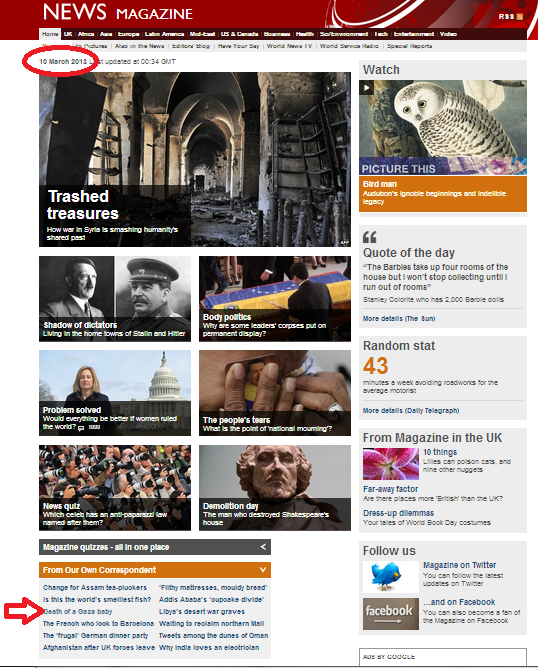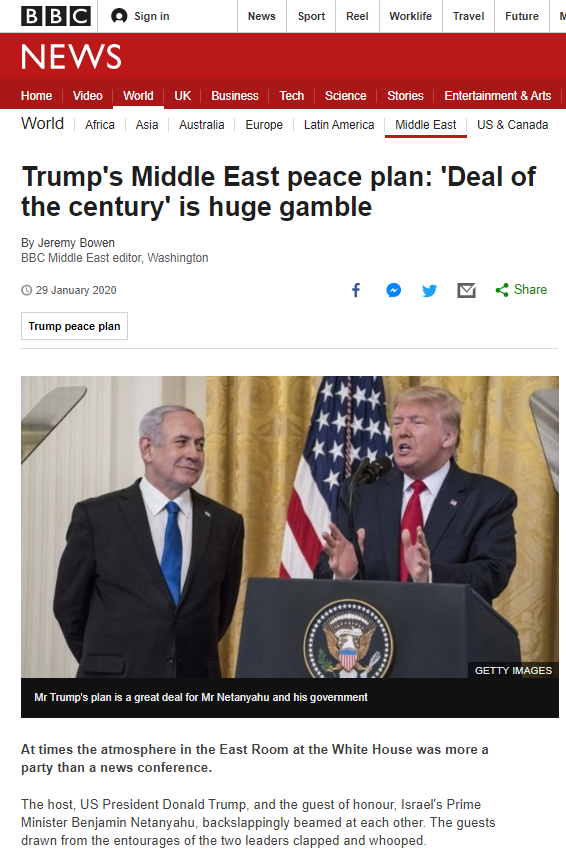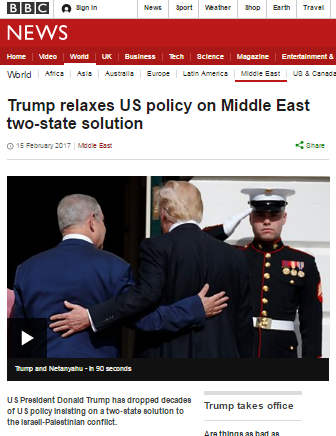On January 15th the Hamas-run Gaza health ministry published an English language Facebook post in which – apparently this time in reaction to the delay of a transfer of cash from Qatar to Hamas – it claimed that “the fuel crisis in hospitals and primary care centers continues to hit critical levels”.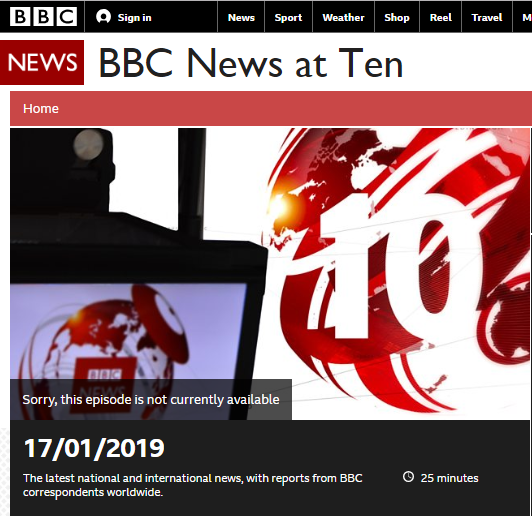
On January 17th the flagship BBC programme ‘News at Ten’ – aired on BBC One and the BBC News channel – ran an item that seemed to have been inspired by that Facebook post and further milked Mishal Husain’s December 2018 trip [see ‘related articles’ below] to the Gaza Strip.
Failing to clarify to viewers that the health ministry in the Gaza Strip is run by the terror group Hamas, presenter Huw Edwards introduced the report (from 23:49 here) as follows: [emphasis in italics in the original, emphasis in bold added]
Edwards: “Now the Palestinian health ministry in the Gaza Strip has said hospitals in Gaza may have to shut down because of shortages of fuel. The UN has warned of a real catastrophe if additional fuel isn’t found. The health system – already on the verge of collapse following years of an Israeli blockade and divisions between Palestinian groups – is now overburdened with casualties from the protests that began last year. More than 25,000 Palestinians have been injured. The BBC’s Mishal Husain visited Gaza and sent this report.”
Edwards of course refrained from clarifying to BBC audiences that those casualties could have been avoided had the same Hamas terror group now claiming that hospitals “may have to shut down” not organised, facilitated and financed weekly violent riots at the border for the past ten months.
As has previously been noted here on the many occasions on which the BBC has falsely promoted the notion of a link between Israel’s counter-terrorism measures and the sorry state of medical services in the Gaza Strip:
“…the restrictions placed on the import of dual-use goods (i.e. items which can be used for terrorist purposes) to the Gaza Strip do not apply to medical supplies. The party responsible for medical services in the Gaza Strip is the Palestinian Authority and it is that body which has in recent months exacerbated the chronic crisis affecting the healthcare system in Gaza by severely cutting medical aid and referrals for treatment in Israel.”
Edwards did not bother to clarify to viewers that what he euphemistically and unhelpfully described as “divisions between Palestinian groups” actually means the fact that the Palestinian Authority has in addition been responsible for power shortages in the Gaza Strip that have affected medical services as well as other fields.
Mishal Husain began her report by also describing months of violent rioting as “protests”, once again employing the specious ‘everybody does it’ argument.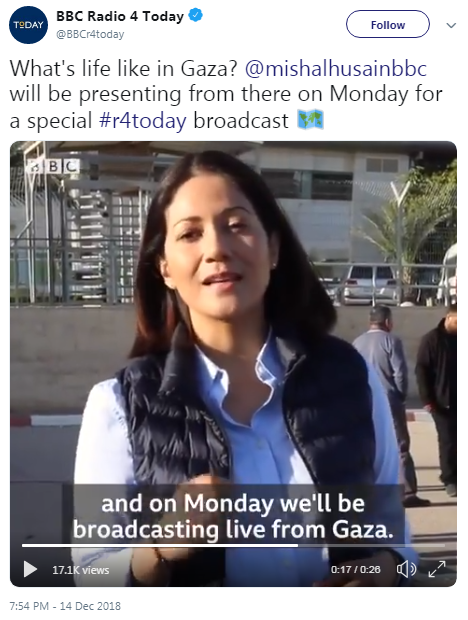
Husain: “It is a new and extreme burden on a health system that was already stretched to the limit: thousands of people with gunshot wounds. Fourteen year-old Walid Ahu [phonetic] is one of those who’ve been injured at the weekly protests near the perimeter fence with Israel. His father says he went along just as other young people have. An Israeli bullet went through both of his legs. There’ve now been months of demonstrations at the boundary. Many Palestinians say their intentions were peaceful, although some have thrown stones, burnt tyres and sent incendiary kites and balloons over the fence. Israel says it’s only used live fire when necessary to protect infrastructure, its soldiers and Israeli civilians living nearby.”
Significantly, Husain sabotaged her audience’s ability to understand and assess what “Israel says” by concealing the fact that in addition to stone-throwing, tyre burning and incendiary attacks, what she calls “protests” have also included border infiltrations, shooting attacks, grenade attacks and IED attacks, with a high proportion of those killed or injured during the riots connected to terror organisations. She went on:
Husain: “The vast majority of the gunshot wounds have been to the lower limb. People like 23 year-old Ahmed Abu Guri [phonetic] who was hit in the upper thigh and will need two more operations and months of rehabilitation. Doctors here say health care in Gaza is now overwhelmed. One calls it an epidemic of gunshot injuries.”
Viewers then heard unsupported speculation from Mohammed Abu Mughalseeb of Medecins Sans Frontiers:
“From my experience I think the…you know, from some friends and colleagues in United Kingdom and in France and United States, if they had the same number of injuries received in the emergency department the health system would collapse. No other places in the world can cope with this, with this huge number of injuries.”
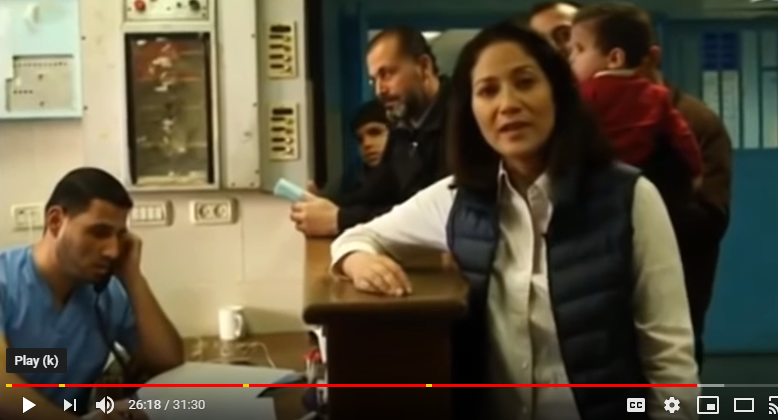
Husain: “Even before this hospital here had acute and unmet needs. This is Gaza’s biggest emergency department which sees around 500 patients every day. There’s a long list of what hospitals here are short of – it’s beds, drugs, medical supplies – but also there’s a chronic shortage of power. There isn’t enough fuel for their backup generators and they don’t even have enough clean water; whether for the patients to drink, for the staff to wash their hands or even to sterilize their instruments.”
As was the case in her December reports, Husain yet again made no effort to adequately explain the background to power and water shortages in the Gaza Strip.
Husain: “For the last few years staff here have received only half their salary. Some are paid by Hamas which controls Gaza, others by the Palestinian Authority in the West Bank. The blockade of Gaza and its effect on the economy comes up again and again. Israel says it doesn’t restrict most medical supplies but Gaza has little money to pay for the health needs of its people.”
Husain failed to inform viewers that medical supplies to the Gaza Strip are provided by the Palestinian Authority or that her claim that “Gaza has little money” for healthcare does not stand up to factual examination.
“According to various estimates by the PA and Israel, Hamas raises NIS 100 million ($28 million) every month in taxes from the residents of Gaza. A significant part of that amount covers the wages of its members. But a large portion is diverted for military purposes. Estimates say Hamas is spending some $130 million a year on its military wing and preparations for war.”
Viewers then heard from Dr Ayman Al Sahabani of Shifa hospital who, while providing a list of those allegedly ‘responsible’ for the dire situation, notably could not bring himself to utter the word Hamas but did employ the terror group’s favoured inaccurate ‘siege’ terminology.
“Our civilians people died and injured all the time. Big question – why? Why? And why we are seeing the siege for 12 years?”
Husain: “Who do you hold responsible for what you are experiencing at the hospital?”
Al Sahabani: “All people. The United Nations, Red Cross, Israel, the Palestinian Authority, here…eh…eh…who’s are in the authority. All are responsible.”
Husain closed her report with a story that does not include enough detail to be verified.
Husain: “Those at the very start of their lives are among the most vulnerable, dependent on specialist equipment and in some cases with conditions that can’t be treated here. Because the blockade restricts the movement of people, patients need to request permission to leave. This two-day old baby with a congenital heart defect was waiting for an exit permit when we filmed him. Four days later he died. His permission hadn’t come through.”
When Husain’s colleague Yolande Knell similarly used the story of an unnamed baby with congenital heart disease in 2017 BBC Watch contacted COGAT and was told that:
“To our regret, an internal Palestinian dispute harms the residents of Gaza – instead of the regime in Gaza helping them – but Israel has no connection to the issue. We would highlight that in cases in which the Palestinian Authority sends requests, and particularly those classified as urgent, COGAT coordinates the immediate passage of patients at any time of the day in order to save lives. This activity is carried out on a daily basis at the Erez Crossing, through which residents of Gaza enter Israel for medical treatment.”
The permits for patients from the Gaza Strip to receive treatment in Israel of course include not only “permission to leave” but a commitment from the Palestinian Authority to fund that treatment. Whether or not the Palestinian Authority – which went completely unmentioned by Husain – actually submitted a request to the Israeli authorities concerning the baby in her report we do not know but what is clear is that Husain attempted to lay the blame for his death at the feet of “the blockade” – i.e. Israel – while concealing the PA’s role in the process of patient transfers from audience view.
Throughout this report and its introduction BBC audiences heard multiple references to Israel’s counter-terrorism measures – but no explanation of why they are necessary – and just one euphemistic reference to “divisions between Palestinian groups”. Yet again we see that the BBC is fully conscripted to promotion of the false narrative according to which the humanitarian situation in the Gaza Strip is primarily attributable to ‘the blockade’ and that it will erase the actions of Hamas and the Palestinian Authority, use sketchy stories about dead babies and dig out previously unused footage filmed over a month ago in order to promote that politically motivated narrative.
Related Articles:
BBC Radio 4’s selective framing of the “hardships” of Gaza Christians
BBC Radio 4 ‘Today’ Gaza Strip special – part one
BBC Radio 4 ‘Today’ Gaza Strip special – part two
BBC Radio 4 ‘Today’ Gaza Strip special – part three
BBC Radio 4 ‘Today’ Gaza Strip special – part four
BBC Radio 4 ‘Today’ Gaza Strip special – part five
Mishal Husain does ‘life in Gaza’ for BBC One TV
The BBC’s monochrome framing of Gaza’s chronic utilities crisis
The common denominators in the BBC News website’s Gaza reporting


